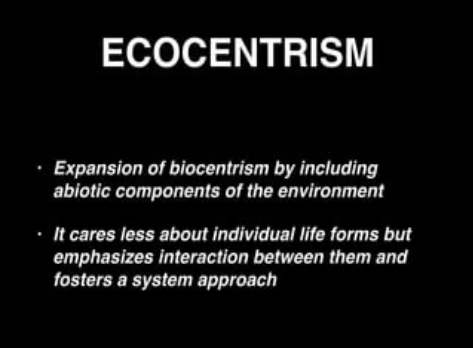ECOCENTRISM AND JAIN PHILOSOPHY: “KAN KAN ME JAAN BASTI HAI”
Why in the news?
Ecocentrism and Jain philosophy gain attention for advocating interconnectedness of all life forms and promoting environmental conservation.
source:slideshare
About Intersection of Ecocentrism and Jain Philosophy:
- “Kan Kan Me Jaan Basti Hai”reflects the Jain philosophy that life resides in every particle of the universe.
- Jains believe in thesanctity of all life forms, from microscopic organisms to large mammals.
- This philosophy guides Jains to practise non-violence(ahimsa) and compassion towards all living beings, promoting harmony and balance in nature.
- Both ecocentrism and Jain philosophy emphasise the interconnectedness of all life forms and the importance of preserving ecological balance.
- They promote respect for nature and advocate for sustainable practices to ensure the well-being of present and future generations.
| What is Ecocentrism?
● Ecocentrism is an ethical perspective that places intrinsic value on the entire ecosystem rather than focusing solely on human interests. ● It advocates for the protection of nature and all its living and nonliving components. ● This philosophy emphasises the interconnectedness and interdependence of all elements within the ecosystem. Ecocentric Practices: ● Sustainable Living: Minimise harm, conserve resources, support eco-friendly initiatives. ● Compassionate Treatment: Respect all life forms, practice vegetarianism, prioritise animal welfare. ● Environmental Conservation: Preserve habitats, biodiversity, and support conservation projects. ● Non-Exploitative Practices: Avoid pollution, deforestation, and unsustainable resource use About Jain Perspective on Life: ● Considers earth, wind, water, and fire as living entities. ● Advocates moral consideration for these elements based on their perceived vitality. ● Reflects Jain philosophy’s reverence for all forms of life, including elements of nature. About Environmental Laws in India: ● Wildlife (Protection) Act, 1972: Protects wildlife and their habitats. ● Water (Prevention and Control of Pollution) Act, 1974: Regulates water pollution. ● Air (Prevention and Control of Pollution) Act, 1981: Controls air pollution. ● Environment (Protection) Act, 1986: Addresses environmental issues comprehensively. ● Biological Diversity Act 2002: Protects biological diversity. ● (Recognition of Forest Rights) Act, 2006 (FRA): Recognizes the rights of forest dwellers. ● Compensatory Afforestation Fund Act, 2016: Governs funds for afforestation. |





